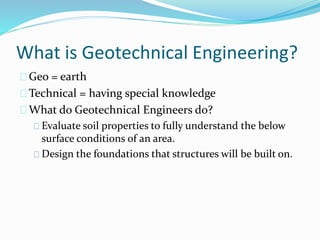An Unbiased View of Geotheta
An Unbiased View of Geotheta
Blog Article
The Geotheta PDFs
Table of ContentsAbout Geotheta5 Easy Facts About Geotheta ShownLittle Known Facts About Geotheta.Some Of GeothetaWhat Does Geotheta Mean?

They conduct website examinations, collect examples, carry out research laboratory examinations, and analyze information to examine the viability of the ground for construction tasks - Geo Tech Engineering. Based upon their searchings for, geotechnical engineers supply referrals for foundation design, incline security, retaining structures, and mitigation of geotechnical risks. They collaborate with various other specialists, such as designers, structural engineers, and building and construction groups, to ensure that geotechnical factors to consider are integrated into the total job style and application
By evaluating the behavior and homes of dirt and rock, they can determine prospective geotechnical hazards such as landslides, soil negotiation, or slope instability. Their know-how assists stop failures or accidents that could jeopardize lives and property. Below are some thorough obligations and responsibilities of a geotechnical designer: Site Examination: Geotechnical designers conduct site investigations to gather data on subsurface conditions.
They analyze the data to comprehend the residential or commercial properties and habits of the dirt and rock, including their strength, leaks in the structure, compaction qualities, and groundwater problems. Geotechnical Analysis and Layout: Geotechnical engineers analyze the data gathered throughout website examinations to assess the security and viability of the site for building and construction jobs. They do geotechnical calculations and modeling to examine variables such as birthing ability, settlement, incline security, lateral planet pressures, and groundwater flow.
9 Simple Techniques For Geotheta
Foundation Style: Geotechnical designers play an essential role in creating structures that can safely support the desired framework. They examine the dirt conditions and lots requirements to figure out the suitable structure kind, such as shallow foundations (e.g., footings), deep foundations (e.g (https://www.behance.net/ianhammond2)., piles), or specialized methods like dirt renovation. They think about elements such as settlement restrictions, birthing capacity, and soil-structure communication to develop optimal foundation designs
They evaluate building plans, screen website tasks, and perform field evaluations to confirm that the design suggestions are complied with. If unanticipated geotechnical concerns emerge, they analyze the situation and give recommendations for remediation or modifications to the design. Risk Evaluation and Reduction: Geotechnical designers evaluate geotechnical hazards and dangers linked with the job site, such as landslides, liquefaction, or soil erosion.

Cooperation and Communication: Geotechnical engineers function very closely with other experts included in a task, such as designers, architectural designers, and construction teams. Effective interaction and collaboration are important to incorporate geotechnical factors to consider into the total job layout and building process. Geotechnical designers offer technological expertise, solution queries, and make certain that geotechnical demands are fulfilled.
Fascination About Geotheta
Right here are some kinds of geotechnical designers: Foundation Designer: Structure designers specialize in developing and analyzing foundations for frameworks. They analyze the dirt conditions, load requirements, and site characteristics to establish the most ideal structure kind and design, such as superficial foundations, deep structures, or specialized methods like stack foundations.
They examine the factors affecting slope stability, such as soil properties, groundwater problems, and incline geometry, and develop approaches to avoid incline failings and minimize risks. Quake Designer: Quake engineers concentrate on evaluating and developing structures to hold up against seismic pressures. They assess the seismic risk of a website, assess dirt liquefaction capacity, and establish seismic layout criteria to ensure the safety and durability of structures throughout earthquakes.
They do field testing, accumulate samples, and evaluate the collected data to identify the dirt residential or commercial properties, geologic formations, and groundwater problems at a site. Geotechnical Instrumentation Engineer: Geotechnical instrumentation engineers focus on tracking and measuring the behavior of soil, rock, and structures. They set up and preserve instrumentation systems that check variables such as dirt negotiation, groundwater degrees, incline motions, and architectural variations to evaluate performance and supply early warnings of prospective concerns.
Fascination About Geotheta
They carry out tests such as triaxial examinations, combination tests, direct shear tests, and leaks in the structure tests to gather information for geotechnical evaluation and style. Geosynthetics Designer: Geosynthetics engineers concentrate on the design and application of geosynthetic materials, such as geotextiles, geogrids, and geomembranes. They make use of these products to improve soil stability, enhance slopes, give water drainage options, and control erosion.
They tend to be investigatory individuals, which implies they're intellectual, reflective, and curious. They wonder, systematic, reasonable, logical, and sensible. Some of them are likewise social, meaning they're kind, generous, cooperative, person, caring, practical, understanding, skillful, and friendly. Does this noise like you? Take our complimentary job test to learn if geotechnical engineer is just one of your leading occupation matches.
In the office environment, geotechnical designers use specialized software devices to carry out calculations, produce layouts, and official site examine information. They prepare records, review project specs, communicate with clients and employee, and coordinate project tasks. The workplace setting gives a helpful environment for research study, analysis, and partnership with other specialists involved in the job.
See This Report on Geotheta
They often go to job websites to conduct site examinations, evaluate geotechnical conditions, and gather information for analysis. These brows through involve taking a trip to various locations, often in remote or challenging surfaces. Geotechnical designers might do soil tasting, conduct tests, and screen building activities to guarantee that the geotechnical aspects of the job are being applied properly.
Geotechnical engineers likewise work in specialized geotechnical laboratories. Geotechnical laboratory designers work extensively in these settings, taking care of testing tools, operating tools, and videotaping information.
Report this page